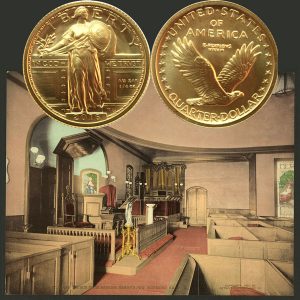Today, the Standing Liberty Gold Quarter Coin remembers the impassioned speech by Patrick Henry in Richmond’s St. John’s Church on March 20, 1775.
From Virginia, 1492-1892, A Brief Review of the Discovery of the Continent of North America, with a History of the Executives of the Colony and of the Commonwealth of Virginia by Margaret Vowell Smith, published in 1893:
=====
But England would not relent, and the pressure of events which thickened as the time rolled on, found Virginia in 1775 embarrassed by unusual difficulties.
Subjected to the tyranny of a Governor now opposed to her every interest, and, saving a little powder in a magazine near Williamsburg, destitute of warlike stores, she was, with many hindrances, quite unprepared for war.
Of all the Colonies, she was most open to attack. The Bay of the Chesapeake, the deep waters of the Potomac, the James, the York, and other streams, exposed her to invasion, and when day after day she saw the English men-of-war hovering upon her coast, she knew “the hour ” had come, and she bared her bosom to the storm.
To meet the crisis, she called a convention to assemble at Richmond in March of this year, 1775.
Williamsburg was no longer a place for revolutionary assemblages. Dunmore sat in his palace and watched in angry silence the progress of events, relying for his own protection on the British men-of-war lying in the river near at hand.
So the patriots convened, March 20, 1775, in Richmond, on what is now known as “Church Hill,” in old St. John’s Church, there to make ready for the morrow.
They knew their cause was just, and they knew that whatever course might be decided on for the defense of Virginia, the people at home were ready to lay down their money and their lives to accomplish it.
Of this Convention Peyton Randolph was chosen President, and here Patrick Henry delivered one of those stirring, fiery appeals of eloquence which has in part come down to us.
He said, addressing the President:
I have but one lamp by which my feet are guided, and that is the lamp of experience. I know of no way of judging of the future but by the past.
And judging by the past, I wish to know what there has been in the conduct of the British Ministry for the last ten years to justify those hopes with which gentlemen have been pleased to solace themselves and the house.
Is it that insidious smile with which our petition has been lately received?
Trust it not, sir; it will prove a snare to your feet. Suffer not yourselves to be betrayed with a kiss.
Ask yourselves how this gracious reception of our petition comports with those warlike preparations which cover our waters and darken our land.
Are fleets and armies necessary to a work of love and reconciliation?
Have we shown ourselves so unwilling to be reconciled, that force must be called in to win back our love?
Let us not deceive ourselves, sir. These are the implements of war and subjugation; the last argument to which kings resort.
I ask, gentlemen, sir, what means this martial array, if its purpose be not to force us to submission? Can gentlemen assign any other possible motive for it?
Has Great Britain an enemy in this quarter of the world, to call for all this accumulation of navies and armies?
No, sir, she has none. They are meant for us; they can be meant for no other. They are sent over to bind and rivet upon us those chains, which the British Ministry have been so long forging.
And what have we to oppose to them? Shall we try argument?
Sir, we have been trying that for the last ten years. Have we anything new to offer upon the subject? Nothing. We have held the subject up in every light of which it is capable; but it has been all in vain.
Shall we resort to entreaty and humble supplication? What terms shall we find, which have not been already exhausted?
Let us not, I beseech you, sir, deceive ourselves longer.
Sir, we have done everything that could be done to avert the storm which is now coming on. We have petitioned; we have remonstrated; we have supplicated; we have prostrated ourselves before the throne, and have implored its interposition to arrest the tyrannical hands of the Ministry and Parliament.
Our petitions have been slighted; our remonstrances have produced additional violence and insult; our supplications have been disregarded; and we have been spurned, with contempt, from the foot of the throne!
In vain, after these things, may we indulge the fond hope of peace and reconciliation. There is no longer any room for hope.
If we wish to be free — if we mean to preserve inviolate those inestimable privileges for which we have been so long contending — if we mean not basely to abandon the noble struggle in which we have been so long engaged, and which we have pledged ourselves never to abandon, until the glorious object of our contest shall be obtained — we must fight!
I repeat it, sir, we must fight!
An appeal to arms and to the God of Hosts is all that is left us!
They tell us, sir, that we are weak, — unable to cope with so formidable an adversary. But when shall we be stronger? Will it be the next week, or the next year? Will it be when we are totally disarmed, and when a British guard shall be stationed in every house?
Shall we gather strength by irresolution and inaction?
Shall we acquire the means of effectual resistance by lying supinely on our backs, and hugging the delusive phantom of hope, until our enemies shall have bound us hand and foot?
Sir, we are not weak, if we make a proper use of those means which the God of nature hath placed in our power.
Three millions of people, armed in the holy cause of Liberty, and in such a country as that which we possess, are invincible by any force which our enemy can send against us.
Besides, sir, we shall not fight our battles alone.
There is a just God, who presides over the destinies of nations, and who will raise up friends to fight our battles for us.
The battle, sir, is not to the strong alone; it is to the vigilant, the active, the brave.
Besides, sir, we have no election. If we were base enough to desire it, it is now too late to retire from the contest.
There is no retreat, but in submission and slavery. Our chains are forged. Their clanking may be heard upon the plains of Boston.
The war is inevitable, — and let it come! I repeat it, sir, let it come!
It is vain, sir, to extenuate the matter.
Gentlemen may cry, ‘Peace, peace! ‘ but there is no peace. The war is actually begun.
The next gale that sweeps from the north will bring to our ears the clash of resounding arms!
Our brethren are already in the field. Why stand we here idle? What is it that the gentlemen wish? What would you have? Is life so dear or peace so sweet, as to be purchased at the price of chains and slavery?
Forbid it, Almighty God ! I know not what course others may take, but, as for me, give me liberty, or give me death!
=====
The Standing Liberty Gold Quarter Coin shows with an image of the interior of St. John’s Church from Patrick Henry’s pew, circa 1901.

